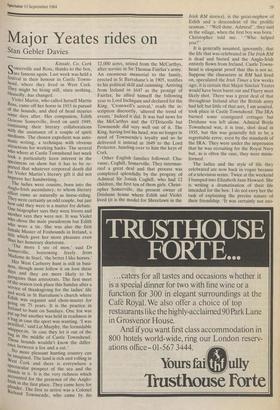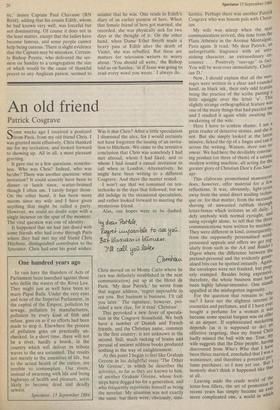Major Yeates rides on
Stan Gebler Davies
Kinsale, Co. Cork Somerville and Ross, thanks to the box, are famous again. Last week was held a festival in their honour in Castle Towns- bend, where they lived in West Cork. They might be living still, since nothing, blessedly, has changed. Violet Martin, who called herself Martin Ross, came off her horse in 1915 in pursuit of the hounds, and died of head injuries some days after. Her companion, Edith Oenone Somerville, lived on until 1949, continuing their literary collaborations with the assistance of a couple of spirit mediums. The chosen expedient was auto- matic writing, a technique with obvious attractions for working hacks. The several who where at Castle Townshend last week took a particularly keen interest in the specimens on show but it has to be re- Ported that whatever corporeal death did for Violet Martin's literary gift it did not Improve her handwriting. The ladies were cousins, born into the Anglo-Irish ascendancy, to whom literary effort came as naturally as horse-riding. They were certainly an odd couple, but just how odd they were is a matter for debate. One biographer says they were lovers and another says they were not. It was Violet who chose the male pseudonym but Edith who wore a tie. She was also the first female Master of Foxhounds in Ireland, a title which gave her more pleasure even than her honorary doctorate. „ The more I see of men,' said Dr Somerville, borrowing freely from Madame de Stael, 'the better I like horses.' Her West Carberry hunt is still in busi- ness, though most follow it on foot these days and they are more likely to be garagistes than aristocrats. The first meet of the season took place this Sunday after a service of thanksgiving for the ladies' life and work in St Barrahane's church where Edith was organist and choir-master for Ping on 75 years. It is the practice in "'eland to hunt on Sundays. One fox was Put up but another was held in readiness in a hag in case the sport was wanting. 'I was Petrified,' said Liz Murphy, the formidable _hiPper-in, 'in case they let it out of the °ag in the middle of Castle Townshend. Those hounds wouldn't know the differ- ence between a fox and a cat.' , No more pleasant hunting country can u,,e. imagined. The land is rich and rolling in west Cork and there is everywhere a spectacular prospect of the sea and the Islands in it. It is the very richness which accounted for the presence of the Anglo- Irish in the first place. They came here for Plunder. The first to arrive was a Colonel Richard Townsende, who came by his 12,000 acres, seized from the McCarthys, after service in Sir Thomas Fairfax's army. An enormous memorial to the family, erected in St Barrahane's in 1905, testifies to his political skill and cunnning. Arriving from Ireland in 1647 as the protégé of Fairfax, he allied himself the following year to Lord Inchiquin and declared for the King. 'Cromwell's arrival,' reads the in- scription discreetly, 'altered the trend of events.' Indeed it did. It was bad news for the McCarthys and the O'Driscolls but Townsende did very well out of it. The King, having lost his head, was no longer in need of Townsende's loyalty and so he delivered it instead in 1649 to the Lord Protector, handing over to him the keys of Cork.
Other English families followed: Cha- vasse, Coghill, Somerville. They intermar- ried a great deal and that process was completed splendidly by the progeny of Admiral Sir Josiah Coghill, who had 12 children, the first ten of them girls. Christ- opher Somerville, the present owner of Drishane house where Edith and Violet lived (it is the model for Shreelawn in the Irish RM stories), is the great-nephew of Edith and a descendent of the prolific seaman. ' "Well done, Admiral", they said in the village, when the first boy was born.' Christopher told me. "Who helped you?" '.
It is generally assumed, ignorantly, that the life that was celebrated in The Irish RM is dead and buried and the Anglo-Irish entirely flown from Ireland.. Castle Towns- hend is eloquent proof that this is not so. Suppose the characters in RM had lived on, speculated the Irish Times a few weeks ago, it is certain that Major Sinclair Yeates would have been burnt out and Flurry most likely shot. There was a great deal of that throughout Ireland after the British army had left but little of that sort, I am assured, took place in Castle Townshend. The IRA burned some coastguard cottages but Drishane was left alone. Admiral Boyle Townshend was, it is true, shot dead in 1935, but this was generally felt to be a regrettable error, even by the standards of the IRA. They were under the impression that he was recruiting for the Royal Navy but, as is often the case, they were misin- formed.
The ladies and the style of life they celebrated are now back in vogue because of a television series. Twice at the weekend I bumped into Elizabeth Jane Howard. She is writing a dramatisation of their life intended for the box. I do not envy her the task of explaining the precise nature of their friendship. 'It was certainly not ero- tic.' insists Captain Paul Chavasse (RN Retd), adding that his cousin Edith, whom he had known very well, was forceful but not domineering. Of course it does not in the least matter, except that the ladies have become famous, and some people cannot help being curious. There is slight evidence that the Captain may be mistaken. Certain- ly Bishop Poyntz, who delivered the ser- mon on Sunday to a congregation the size of which would be the cause of thankful prayer to any Anglican parson, seemed to assume that he was. One reads in Edith's diary of an earlier passion of hers. When that female friend of hers got married, she recorded, she was physically sick for two days at the thought of it. On the other hand, when Dame Ethel Smyth made a heavy pass at Edith after the death of Violet, she was rebuffed. But these are matters for television writers to worry about. 'You should all write,' the Bishop told us on Sunday, 'as if Jesus was going to read every word you wrote.' I always do.



















































 Previous page
Previous page